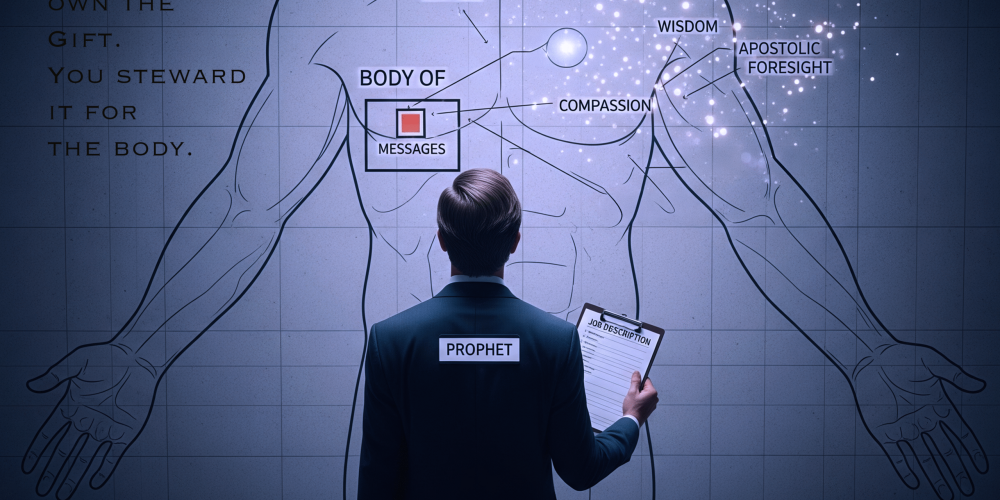Sample Subtitle
Why This Matters
These four confusions aren't just theological technicalities.

Michael Robert
Founder
They create real problems: fractured teams, gifts that compete instead of collaborate, and APEST implementations that overpromise and underdeliver.
When you understand what APEST gifts are (and are not), everything changes. Much of the dysfunction in APEST ministry can be traced to four subtle but devastating category errors.
Understanding these confusions is the first step to recovering the dynamic, Christ-centered nature of the five-fold gifts. Let’s clear up the four most common misunderstandings. When these four confusions are clarified, APEST ministry won’t just move forward; it becomes what it was always meant to be, His ministry operating system.

1st
Being vs. Doing Confusion
Mistaking WHO you are for WHAT the gift does.
This is about confusing personal identity with spiritual function. People think, “I AM an apostle,” instead of understanding that “I ACCESS apostolic function.”
The Problem This Creates: People get stuck in boxes when gifts become identity labels. You end up with “apostles” who won’t shepherd and “shepherds” who won’t pioneer. The gift becomes a limitation instead of a dynamic function.
APEST gifts aren’t personality types or permanent titles. They’re dynamic, grace-empowered functions designed to produce specific outcomes, such as unity and maturity within the body.
It’s like calling yourself a ‘wrench’ instead of a mechanic. Imagine a mechanic introducing themselves as ‘Hi, I’m Hammer.’ Awkward, right? (And then refusing to fix anything outside your tool’s job description).
2nd
Access Point Vs. Job Role
Reducing divine awareness to human roles

This confusion treats APEST gifts like job roles instead of what they actually are: grace-apportioned functions Christ gives to His body, through which He expresses dimensions of His ministry by His Spirit. The role exists in Christ (ontologically), is given and activated in you, for others, in a particular moment, not because it’s listed on some assignment sheet attached to your spiritual résumé.
Clarification: We don’t “access” APEST like an ATM. It’s not a tool you grab when you feel like it. It’s the difference between cheap functionalism and deep Christian ontology. We receive dimensions of Christ’s own being as grace-distributed faculties. And when those manifest in us, they mediate awareness of Christ’s presence, not because we tapped in, but because they originate in Him and through Him as Head of the Body.
And that’s what makes “Access Point” a tricky but important term. Yes, you are an access point, but only as a derived conduit, not as an autonomous operator or consciousness hacker. You’re not walking around pulling spiritual levers; you’re carrying what’s been given for the Body, from Christ, through grace.
The Problem This Creates:
When gifts become job roles, you miss their real purpose. It’s not about what you do, it’s about how you access Christ’s perspective. It’s the difference between “I do prophetic tasks” and “I receive the prophetic Christ gives for His body.”
APEST gifts are epistemic lenses: ways of perceiving and knowing that shape how communities experience Christ’s presence, wisdom, and mission.

3rd
Flexible Expression vs. Fixed Structure
Confusing dynamic operation with organizational titles
What’s the confusion? People mistake the way gifts flow contextually and relationally for fixed, permanent church offices or titles. Just because someone operates prophetically or apostolically at a moment doesn’t mean they need to hold the formal title “Prophet” or “Apostle” forever. The problem this creates: When we turn dynamic, grace-activated expressions into rigid structures, we trap God’s gifts in human hierarchies. The living flow of Spirit-led ministry becomes stuck in static roles. People start guarding titles and positions instead of freely serving in the Spirit’s power.
What APEST really is: APEST gifts are modal — flexible modes of operation that appear in response to context, relationships, and need. They’re not structural fixed chairs or engraved nameplates in a church hierarchy. Metaphor: Is this a dance you step into when the music plays, or a chair with your name carved on it forever?
4th
Autonomy vs. Alignment Confusion
Mistaking independent operation for integrated function

This is about confusing individual gift operation (autonomy) with integrated, Spirit-led collaboration (alignment). People treat APEST gifts as if they’re meant to function in isolation, e.g., “I’m the teacher, you’re the prophet, stay in your lane,” instead of understanding that these gifts were designed to work together as a unified diversity, Spirit-led system under Christ’s headship.
The Problem This Creates:
When APEST gifts operate independently, they tend to drift into competition, redundancy, and imbalance. Communities end up overbuilt in some areas and neglected in others. The body gets fragmented instead of being formed into the fullness of Christ.
It’s like trying to drive a car where the wheels, engine, and steering each think they’re in charge. It doesn’t matter how good each part is on its own; without alignment, the system breaks down.
Sample Subtitle
Ready to Go Deeper?
Understanding these four confusions is the first step. But they’re not isolated problems; they’re connected to a deeper pattern. Discover how these confusions cascade and reveal the root of APEST dysfunction.
- Website Design
- Video Production
- Secure Payment



